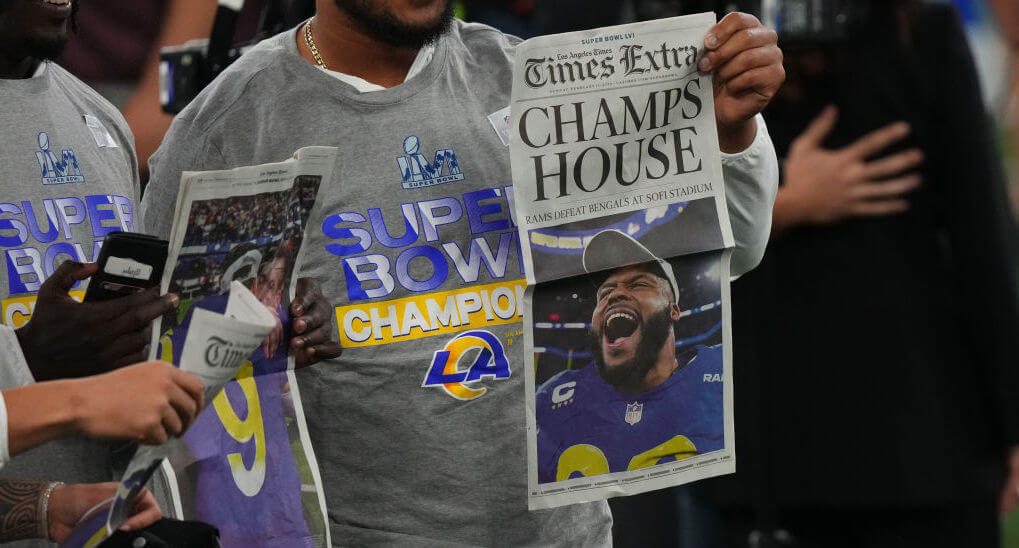New LA Times sports section has Sabbath-observant fans feeling boxed out
With the paper eliminating scores and recaps, some print subscribers mourn a Shabbat ritual

A Los Angeles Rams player holds up the Los Angeles Times Extra sports section following the Super Bowl in 2022. Photo by Cooper Neill/Getty Images
When the Lakers had a Friday night playoff game, Daniel Rabin would go to sleep in suspense. As a Sabbath-observant Orthodox Jew, he couldn’t watch the game or follow along online. He would have to wait until the next morning’s Los Angeles Times to learn what happened.
Early Saturday — whether or not the Lakers had a game the night before — Rabin would read game stories over a bowl of Life cereal, poring over the box scores and standings. Then he would banter with his dad about the results on the way to services.
Many Orthodox households followed the same tradition.
“That was a part of my Shabbat ritual,” Rabin, 34, said. “Friday nights, thinking about the game — were they going to be up in the series or down in the series? — and then being able to like, luxuriate in that on Saturday morning.”
But major changes to the sports section announced by the Times on Sunday mean that won’t be possible anymore. Due to recent layoffs and a looming change to the paper’s printing process, the sports section has stopped being a report of games held the day prior. The new section aspires to “the look and feel of a daily sports magazine,” according to a Times news release — and game recaps, box scores, and standings are no longer a part of it.
The change crushed sports fans all over the Los Angeles metro area, especially Sabbath-observant print subscribers for whom the Saturday sports section was a joy of Jewish life. And it re-opened a question Orthodox Times readers had long ago solved: What if you simply can’t wait 25 hours to find out who won?
For Ari Cohen, who like Rabin grew up in the modern Orthodox neighborhood of Pico-Robertson, the time between a big game’s actual conclusion and when he checked the sports section Saturday morning was a moment of ultimate possibility he likened to Schrödinger’s cat.
“It was like old timey news, where it doesn’t exist until you get that paper,” Cohen said.
Sports Saturday was such an institution in the Cohen household that when Ari was at sleepaway camp, his parents mailed him box scores from the paper so he could stay on top of his teams.
Cohen, 40, now works in Jewish youth sports, and sees his Shabbat morning reading as formative. He read the section cover to cover, even columns by writers he disliked and stories about sports he didn’t follow.
“Box scores are one of those things you can read through once, then read again and notice more things,” he said. “As the day goes on, you could continue to go further and further.”
Beyond the Times
The L.A. Times is not the only paper that has shifted its approach to sports coverage. Newspapers across the U.S. have been hit hard by readers’ pivots to online content. Their phones supply a steady stream of video highlights and up-to-the-minute scores. The New York Times, which pulled its box score page last year, announced Monday that it was disbanding its sports department as it integrates The Athletic, a sports website it acquired in 2022, into the rest of the publication.
According to the L.A. Times’ sports editor, Iliana Limón Romero, the layoffs affected three of the four staffers who produced the box scores for the section, and when the paper moves to a different printing press next year, the section will needs to be typeset at 7 p.m., when most West Coast games are only beginning — at least four hours sooner than the current deadline.
The deadline change would have killed the Times boxscores eventually, she said, but the staffing changes hastened its demise.
Though many papers had dropped their box scores in recent years, “for us to continue to do them was a point of pride,” Limón Romero said. “But it was throwing resources toward that or throwing resources toward our reporters being in the position to do original reporting.”
But even if you could find box scores online, the way they were laid out in the L.A. Times’ sports section made for a superior reading experience, Rabin said. The online box scores require scrolling, are redundant and contain advanced stats he doesn’t care to read. The newspaper box scores distilled game statistics to a rectangle about an inch wide by three inches tall — compact enough to fit the full slate of games on one page.
According to Limón Romero, some of the sports info was templated. But a lot wasn’t — and all of it required daily layout, copy editing and fact checking, requiring one person to commit at least four hours to the box scores and standings every day.
This plus a column for +/- is all you need. pic.twitter.com/WXuWnEfiYt
— Louis Keene (@thislouis) August 19, 2020
Rabin, who works in financial services, now lives in the Philadelphia area, and while he has a digital subscription to the Inquirer, The New York Times and the Wall Street Journal, he doesn’t have a print subscription to any paper because none of them have the box scores. When the Lakers clinched their second-round series against the Warriors on a Friday night in May, he asked a security guard at his synagogue the next day.
Neither the security guard spoiler nor catching the highlights after Shabbat ends Saturday night hits quite the same way as holding the headline, splash photo and box scores all in your hands, Rabin said. By Saturday night, the next day’s games have already started, and the next week — and all of its distractions — have already begun.
While Rabin struggled to picture his childhood without the sports section, Cohen predicted that the temptation to find out the score — with no deliverance expected the next day — would be too much for some to bear.
“Something like that could push a kid that age from being shomer-Shabbos to not,” said Cohen. “With a phone at your fingertips, that’s a thing I could absolutely imagine happening.”
Correction: The original version of this article mischaracterized the changes at The New York Times. It folded its sports desk, reassigning its staff to other desks, not its print sports section, which will now contain content from The Athletic.
Editor’s note: This story has been updated to include comment from L.A. Times Sports Editor Iliana Romero.

















